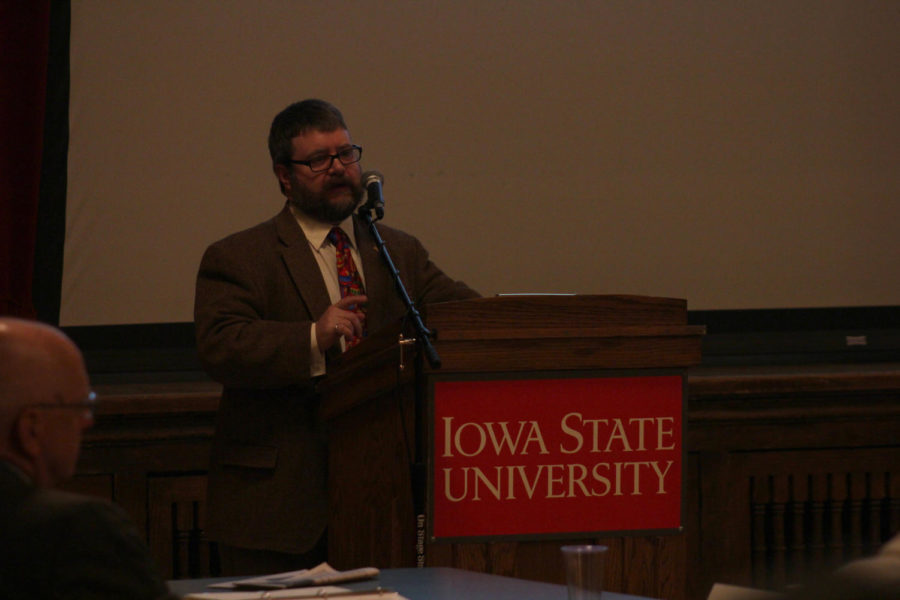Faculty Senate discusses tenure
Korrie Bysted/Iowa State Daily
Steve Freeman from the department of agricultural and biosystems engineering talks about the changes in faculty review policies at the Faculty Senate meeting Dec. 9 in the Great Hall of the Memorial Union.
December 10, 2014
Faculty Senate passed a motion to change the language of post-tenure reviews at the Dec. 9 senate meeting.
During discussion on a bill about post-tenure reviews, arguments centered on the language that categorizes a professor’s work as below expectations, meeting expectations or exceeding expectations.
An amendment was proposed to drop the exceeding expectations category.
As it stands now, all three categories are presented on post-tenure reviews. However, some senators said the exceeding expectations category can be divisive and hurtful.
“I do not understand why people down-play the meets expectations. That’s a good thing,” said Veronica Dark, professor of psychology.
They said the meeting expectations category has a negative connotation associated with it, and they reasoned that meeting expectations is what the senate is supposed to do. If a faculty member is consistently meeting expectations for a period of years, they are performing well and are doing what they are paid to do.
“We always hear if everyone can improve. Well that’s true, but why should you be put under pressure because you are only meeting expectations, not exceeding expectations?” Dark said.
Senators said the reason the exceeding expectations category was on the review in the first place was to appease legislators when they noticed a problem with tenured professors who had “gotten lazy” after reaching tenure.
Others brought up the point that the exceeding expectations category could still be a requirement for associate professors who are trying to reach tenure.
The senate approved both the amendment and the bill, so the exceeding expectations category was removed.
Provost Jonathan Wickert spoke to the senate about a classroom improvement initiative that will be started next semester.
The administration will allocate $1.5 million next year to renovate centrally controlled classrooms.
The initiative, Wickert said, is taking place partly because of enrollment growth. The plan is to speak to faculty and students who currently use the classrooms about their satisfaction with classrooms. They will be asking about satisfaction in climate control, physical access, visual capabilities, seating layout, flexibility of use and internet access.
Wickert also spoke about the university’s solution to testing center over-use.
The Government of the Student Body brought administrator’s attention to the fact that some students would have to wait a maximum of five hours in testing center lines during finals week.
Administrators responded by increasing the amount of testing centers and the amount of seats in the centers. They are also using a marketing and advertising campaign with incentives to get students to take tests during non-peak hours, such as early in the morning Dec. 15 and 16 of Finals Week.
Wickert said if testing centers aren’t improved this semester, they will look into restricting some classes’ use of testing centers during Finals Week.

















